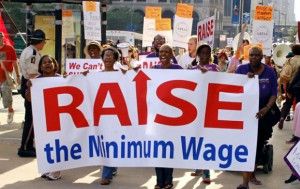L.A. City Council votes to raise minimum wage to $15/hour
by Josephine Djuhana | May 20, 2015 12:06 pm
In a 14-1 vote, the Los Angeles City Council voted[1] to raise the minimum wage in the city of Los Angeles to $15.00 per hour by 2020. Small businesses were given an additional one-year “phase in” period, requiring a $15.00 wage by 2021.
[row][double_paragraph][accordion][acc title=”L.A. Wage Increase (on July 1 of each year)”]2016: $10.50 per hour
2017: $12.00 per hour
2018: $13.25 per hour
2019: $14.25 per hour
2020: $15.00 per hour[/acc][/accordion][/double_paragraph][double_paragraph][accordion][acc title=”Small Businesses Increase (on July 1 of each year)”]2017: $10.50 per hour
2018: $12.00 per hour
2019: $13.25 per hour
2020: $14.25 per hour
2021: $15.00 per hour[/acc][/accordion][/double_paragraph][/row]
 [2]L.A. Mayor Eric Garcetti praised the actions of the City Council and said in a press release[3]:
[2]L.A. Mayor Eric Garcetti praised the actions of the City Council and said in a press release[3]:
“Today, help is on the way for the 1 million Angelenos who live in poverty. I started this campaign to raise the minimum wage to create broader economic prosperity in our city and because the minimum wage should not be a poverty wage in Los Angeles.”
The approval of the wage raise is a success for people like Albina Ardon, a McDonald’s employee from Los Angeles and an active member of the Fight for $15 LA[4]. She wrote in a press release:
“By voting to raise the minimum wage to $15 an hour, the Los Angeles City Council has just shown what workers are capable of when we stick together. People used to think we had no chance, but we are steadily winning the fight by demanding $15 an hour to lift our families out of poverty.
“People like me, who work hard for multibillion-dollar corporations like McDonald’s, should not have to rely on food stamps to survive. My life would be completely different if I were paid $15 an hour. I could afford groceries without needing food stamps, my family could stop sharing our apartment with renters for extra money, and I’d be able to provide my daughters with some security.”
Anna Chu, vice president of policy and research at the Center for American Progress Action Fund[5], said raising the minimum wage “is one of the most direct actions that policymakers can take to raise wages for low-income workers.”
“While the sample size is still relatively small, cities that raise their minimum wages have seen drops in unemployment more often than not, belying the doomsday claims of those who oppose such increases. Cities have led on the issue of raising the minimum wage, and they are seeing the benefits of workers having more money in their pockets and more economic security.”
But not everyone views the increase as a positive change. The California Restaurant Association[6] said in a press release yesterday that they were “disappointed the Los Angeles City Council voted in favor of an extreme approach to a minimum wage increase.”
“The California Restaurant Association has advocated for a comprehensive minimum wage increase that ensures the higher wage is targeted to those that need it most.
“Unfortunately, the City Council voted in favor of a policy that:
- Excludes total compensation, which would provide owners the ability to create wage equality between tipped and non-tipped workers.
- Limits a teen wage to ages of 14-17, for only 160 hours, thereby restricting access to entry-level jobs that teach youth the skills they need to succeed.
- Attaches further wage increases to the Consumer Price Index, which is the equivalent of putting the minimum wage on auto-pilot and ignoring any economic impacts or other factors.”
Economic Professor David Neumark of UC Irvine wrote in an L.A. Times article[7] on Sunday that “[s]imply requiring employers to pay $15” per hour would not solve the market forces at hand that cause low wages and a lower standard of living:
“In fact, data indicate that minimum wages are ineffective at delivering benefits to poor or low-income families, and that many of the benefits flow to higher-income families. That’s because minimum wages target low wages rather than low family incomes. And many minimum-wage workers are not poor or even in low-income families; nearly a quarter are teenagers who will eventually find better-paid jobs. …
“Yet another reason to be wary of raising the minimum wage is that modest job loss overall may mask much steeper job loss among the least skilled. Economists use the phrase “labor-labor substitution” to describe employers responding to a higher minimum wage by replacing their lowest-skilled workers with higher-skilled workers, whom they are more willing to hire at the higher minimum.”
- voted: http://clkrep.lacity.org/onlinedocs/2014/14-1371_CA_05-19-2015.pdf
- [Image]: http://calwatchdog.com/wp-content/uploads/2015/04/minimum-wage-raise.jpg
- in a press release: http://www.lamayor.org/city_council_passes_raisethewagela
- Fight for $15 LA: http://lafightfor15.org/
- Center for American Progress Action Fund: https://www.americanprogressaction.org/press/release/2015/05/19/113442/release-raising-the-minimum-wage-in-cities-is-good-for-workers-good-for-jobs/
- California Restaurant Association: http://www.calrest.org/newsroom/la-city-council-approves-15-minimum-wage
- L.A. Times article: http://www.latimes.com/opinion/op-ed/la-oe-neumark-minwage-20150510-story.html
Source URL: https://calwatchdog.com/2015/05/20/l-a-city-council-votes-to-raise-minimum-wage-to-15hour/